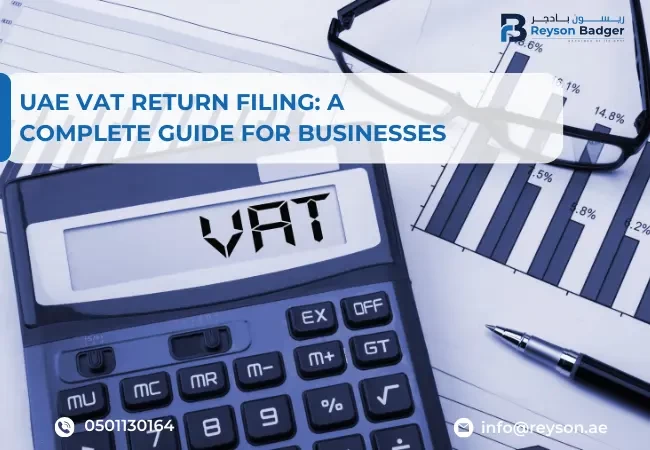UAE VAT Return Filing: A Complete Guide for Businesses
Written By Akshaya Ashok, Reviewed By Nouphal P C
Published on 18/12/2024

What is VAT?
VAT, or Value Added Tax, is a type of tax added to most goods and services in the UAE. It started on January 1, 2018. This tax is charged at every step of the supply chain, but the customer pays the final cost. Businesses collect VAT for the government, working like tax collectors. In this blog, we’ll help you understand everything you need to file your VAT return smoothly, from the important documents to the simple steps and tips to stay on track.
In the UAE, the usual VAT rate is 5%. But there are exceptions! Some goods and services, like exports, certain education and healthcare services, and investment-grade precious metals, are taxed at 0%. On top of that, things like residential properties and local passenger transport don’t have any VAT at all.
Why is VAT Return Filing Necessary?
Filing VAT returns accurately and on time is a crucial responsibility for businesses in the UAE. Here's why it's so important:
- Legal Compliance: As a business, filing VAT returns on time is essential to avoid fines or penalties. Regular submissions help you stay compliant with tax regulations.
- Avoiding Penalties: Missing deadlines or making mistakes on your VAT returns can lead to extra costs. Filing your returns on time and correctly helps you avoid these penalties.
- Protecting Your Reputation: When you file VAT returns on time, it shows your business is responsible and trustworthy. This helps build stronger relationships with customers and suppliers.
- Better Cash Flow Management: Filing VAT returns on time helps you keep track of your finances. You’ll know if you need to pay VAT or if you’re getting a refund, which makes managing your money simpler.
- Smoother Audits: Having accurate records makes audits easier and faster. You’ll spend less time and energy dealing with inspections.
To make VAT Return Filing easier, it’s important to stay up-to-date with any changes in VAT laws or filing rules. Filing your VAT returns on time and correctly not only keeps you compliant but also helps your business run smoothly and builds trust with your customers.
What are VAT Filing Deadlines in UAE?
Staying on top of your VAT filings is crucial for any business in the UAE. Keeping your business VAT-compliant in the UAE is simple if you remember two things: deadlines and what to include in your return. Missing deadlines can lead to penalties, so let's break down the key filing dates.
- Q1 (Jan-Mar): Deadline is April 28th
- Q2 (Apr-Jun): Deadline is July 28th
- Q3 (Jul-Sep): Deadline is October 28th
- Q4 (Oct-Dec): Deadline is January 28th
Important Note: If the 28th falls on a weekend or public holiday, the deadline shifts to the next.
What Documents are Required for VAT Return Filing in UAE?
- Sales Invoices: These show the sales you made and the VAT you charged. They help you track your income.
- Purchase Invoices: These show what you bought and the VAT you paid.
- Receipts: Keep receipts for your business expenses. They prove what you’ve paid and help with accurate reporting.
- Accounting Records: These are your financial statements. They show all your business activities and help with your tax filing.
- Contracts and Agreements: These documents detail your terms with clients and suppliers, which can affect your tax.
- Bank Statements: These show all your business transactions and help confirm your financial records.
Having these documents organized will make filing your VAT return much easier and help ensure you stay compliant with UAE tax laws.
What are the Steps to Prepare for VAT Return Filing?
- Gather Required Documents: Collect all necessary records, including sales and purchase invoices, receipts, accounting records, contracts, and bank statements.
- Log Into the FTA Portal: Use your login details to access the Federal Tax Authority (FTA) website and enter your account.
- Find VAT Returns: Once logged in, go to the 'VAT' section to find the VAT return forms.
- Enter Tax Period Details: Select the appropriate tax period for which you're filing the return.
- Enter Sales and Purchases Data: Enter details of your sales and purchases, including VAT amounts.
- Review VAT Calculations: Check the system-generated calculations for accuracy.
- Submit VAT Return: After reviewing, submit the VAT return form electronically through the FTA portal.
- Make VAT Payment: If there's VAT payable, proceed to make the payment using the available methods.
- VAT Filing Confirmation: After submission, download and save the confirmation receipt for your records.
By following these steps, you'll ensure your VAT return is filed accurately and on time, keeping your business in good standing with UAE tax authorities.
How to Avoid Errors When Filing VAT Returns?
To avoid errors when filing VAT returns in the UAE, here’s what you can do:
- Double-check Calculations and Invoices:
Make sure your VAT calculations are correct, and that all invoices have the necessary details.
- Include Zero-Rated or Exempt Sales:
Don’t forget to report zero-rated or exempt sales, even though they don’t involve VAT.
- Avoid Claiming VAT on Non-Recoverable Expenses:
Be careful not to claim VAT on expenses you can't recover, like entertainment or vehicle costs.
- Use Accounting Software:
Good software can help reduce mistakes and make VAT filing easier.
- Keep Clear Records:
Stay organized with your records and review everything before submitting your return.
Following these steps can help you file VAT returns smoothly and without errors.
Conclusion
Filing VAT returns in the UAE doesn’t have to be complicated. By staying organized, following the necessary steps, and ensuring all documents are in order, you can avoid common mistakes and ensure timely, accurate filings. Keeping track of important deadlines, using reliable accounting software, and reviewing your data can help make the process much smoother. Remember, VAT return filing is essential for your business’s legal compliance, cash flow management, and reputation. If you need expert help navigating the process, Reyson Badger is here to offer the support and guidance you need to stay on track and keep your business compliant.

Written By
Akshaya Ashok
Akshaya Ashok is a content writer specializing in creating content focused on accounting and auditing. With over two years of experience, she has developed expertise in crafting professional content for the financial sector.

